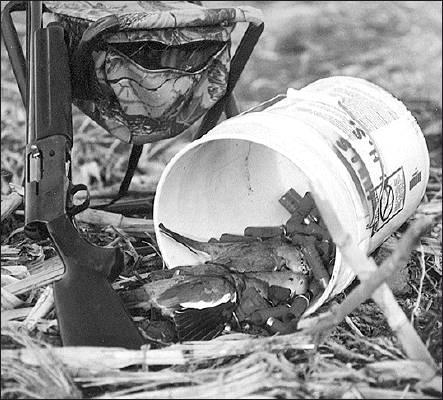Open Season
August 1 marked the beginning of a 31-day countdown to opening day of the 2019-20 dove season in most of Texas. It also means the start of a new fiscal year is just around the corner for the folks at the Texas Parks and Wildlife Department.
The state agency’s annual budgetary timeline kicks in on Sept. 1. The same is true for new hunting, fishing and boating regulations voted in earlier this year by the TPW Commission and the 86th Texas Legislature.
September also brings about some legal business for the millions of sportsmen who purchase the various licenses, stamps and other permits that are required to hunt and fish in this state.
PAYING TO PLAY
Most current licenses will expire at midnight on Aug. 31. If you plan to hunt or fish in Texas after that date, you will need a new license along with the proper stamp endorsements to do it.
Dove hunters are required to have a valid hunting license and a migratory bird stamp before they head to the field on the morning of Sept. 1.
The same conditions apply for fishermen. You can’t legally wet a hook in public water after midnight on Aug. 31 without a new license, unless you are exempt from licensing requirements or purchased a special “Year from Purchase” fishing license during the last 12 months.
TPWD always allows its constituents plenty of leeway to get licensing obligations fulfilled ahead of time. Licenses traditionally go on sale Aug. 15 at around 1,700 retail outlets, including gun shops, sporting goods stores, bait houses, tackle shops, marinas and TPWD offices and state parks.
Licenses also can be purchased at any time via TPWD’s website, tpwd.texas.gov/ business/licenses/online_sales/, or by phone by calling 800-895-4248, Monday-Friday, 8 a.m-5 p.m. Online purchases require an approved credit card with an additional $5 administrative fee assessed for each transaction.
Most licenses are valid at the time of purchase using a confirmation number, except those used when hunting animals requiring a tag such as deer and turkey.
Hunters must wait until the license tags are physically in their possession before taking a deer or turkey, unless they are hunting on a property using managed lands deer permits or another special permit, according to Stormy King, TPWD assistant commander of wildlife enforcement. Licenses purchased online should arrive by mail within 7-10 days of purchase.
Buying online is convenient, but there is always an inherent risk of a computer glitch or some other flaw that could delay the timely delivery of licenses and permits.
The best way to save the worry is to buy the old fashioned way. Making a trip local sporting goods outlet to get your license also provides an opportunity to pick up a few extra boxes of shotshells, new camo or other items you might need in the field or around hunting camp this season.
TPWD maintains a full list of vendors searchable by city on its website. There also is a list of frequently asked questions regarding licensing requirements.
SHOPPING EARLY AND HIP SURVEY
It’s always wise to do your license shopping early. Wait until the afternoon before dove season gets underway, and there is a good chance of running into a long line of procrastinators.
Be sure to bring along proper identification when purchasing your new license. Also, make sure the license clerk performs the Harvest Information Program (HIP) Certification survey before printing the paperwork.
Completing the HIP survey consists of verbally answering a few questions about how many migratory birds (dove, ducks, geese, etc.) you shot last year. The information is used to help the U.S Fish and Wildlife Service gather harvest data that is useful in managing migratory bird populations and setting limits from one year to the next. HIP certification is federally mandated for hunting migratory birds in Texas.
NO NEW FEES
Texas has some of the nation’s best outdoor opportunities and the license fees sportsmen pay to enjoy them are nominal compared to the high quality of the goods. It’s encouraging to know the cost of hunting and fishing licenses have remained unchanged for a decade now.
The last time there was a general increase in Texas license fees was Sept. 1, 2009 — the start of fiscal year 2010. Fees increased 5% across the board on everything from standard hunting and fishing licenses to boat registration and titles.
The price hike resulted in a $4 increase in the cost of TPWD’s most popular license package — the Super Combo — which went from $64 to $68.
The most significant increase that year was levied on the Lifetime Combination hunting/fishing license, which increased from $1,000 to $1,800 — an 80% jump.
YOUR MONEY AT WORK
Hunting and fishing are big business in Texas. In fiscal year 2018, there were roughly 3.1 million licenses, permits, stamps and tags purchased by outdoors enthusiasts around the state. The sales generated about $102.7 million in revenue, according to Ken Kurzawski, manager of regulations and information with TPWD’s inland fisheries division.
License fees are used to help pay for fishing stockings, wildlife management, habitat restoration, land conservation, game wardens and other TPWD operating expenses. In fiscal year 2018, the state agency had a total operating budget of about $469.2 million, Kurzawski said.
CHOICES, CHOICES
TPWD’s resident licensing framework is structured so hunters/anglers can streamline their purchases to suit their specific needs.
If you hunt, but don’t fish, you can buy just a hunting license for $25, plus any necessary stamp endorsements for the game you intend to hunt. There also are licenses tailored for sportsmen who fish, but don’t hunt.
A hunting license is required of all Texas hunters. The only exceptions are for those hunting nuisance coyotes, feral hogs and some fur bearers.
The 86th Legislature eliminated licensing requirements for hunting feral hogs earlier this year, but King says hunters should be aware that the blanket licensing exemption may or may not be applicable on some public lands.
“While there may be area specific regulations, generally, the blanket exemption does not apply to public land,” King said. “It’s best to check with the managing entity ahead of time.”
There are price breaks available on some hunting licenses. To wit:
Resident seniors 65 and older and resident/non-resident youths 16 and under can buy a hunting license for $7; youth-only licenses require no state stamp endorsements. TPWD also extends deep discounts to qualifying disabled veterans and active military duty residents with free Super Combo packages.
Fishermen can buy fishing licenses that are valid for freshwater, saltwater or both. Fishing license requirements are waived for those under 17, those born before Jan. 1, 1931 and the mentally disabled. Also, no license is required to fish in state park waters and on all public waters on days that are declared “free fishing days.”
GOOD DEALS
The best deal going for serious sportsmen who hunt and fish is the
Super Combo license package. The Super Combo is always TPWD’s most popular seller. It includes resident hunting and fishing licenses and all the stamp endorsements required for fishing in fresh and saltwater, hunting with archery gear and hunting upland game birds and migratory birds. Kurzawski says there were 439,348 Super Combo licenses sold last year.
The Super Combo’s $68 price tag represents an $18 savings over buying the two licenses and multiple stamps separately. However, it does not include the cost a $25 Federal Duck Stamp or a $48 Annual Public Hunting Permit.
The APHP — also available where licenses are sold — is a bargain for hunters on a budget. The permit provides year-round access to public hunting lands totaling more than one million acres, including several TPWD wildlife management areas.
Additionally, the permit allows for dove and small game hunting on more than a 100 properties that will be included in TPWD’s private lands dove lease program this fall. The department will have 112 properties totaling more than 42,500 acres in the program this year, according to Kelly Edmiston, TPWD public hunts coordinator.
Texas hunters have plenty to think about with a long line of hunting seasons just around the corner. Getting legal with a new license is an important part of the game that shouldn’t be forgotten.
Time to pay the piper.




